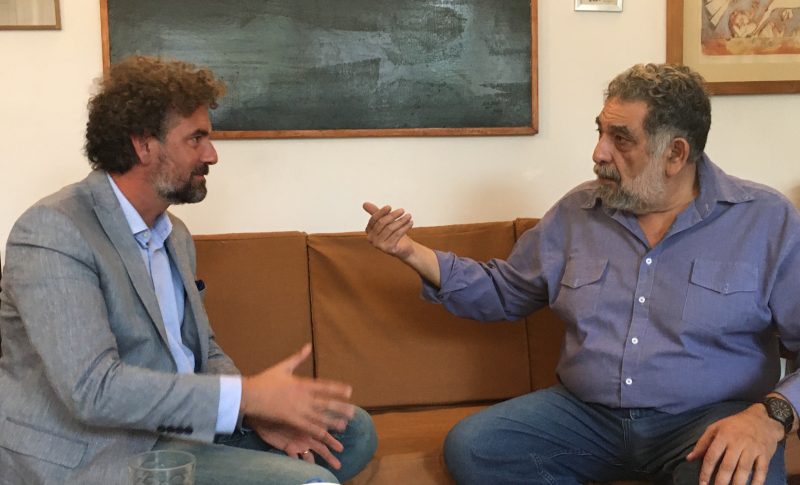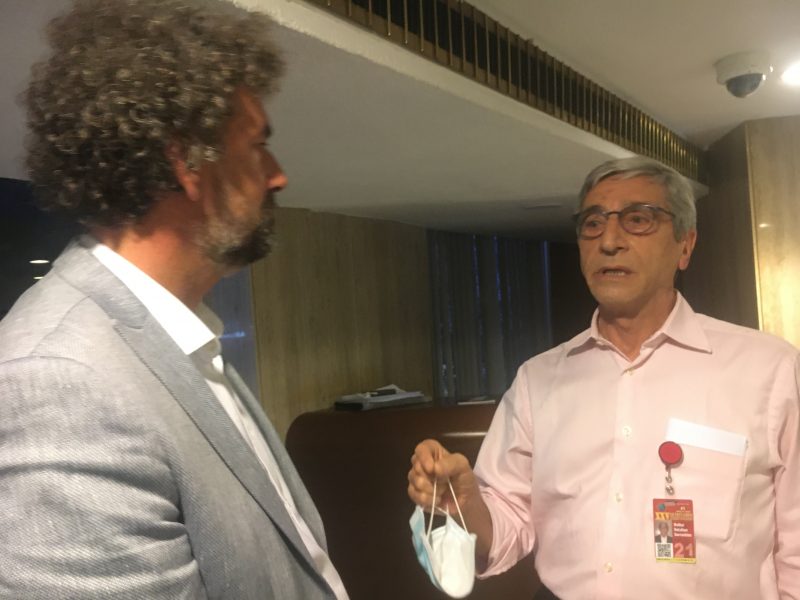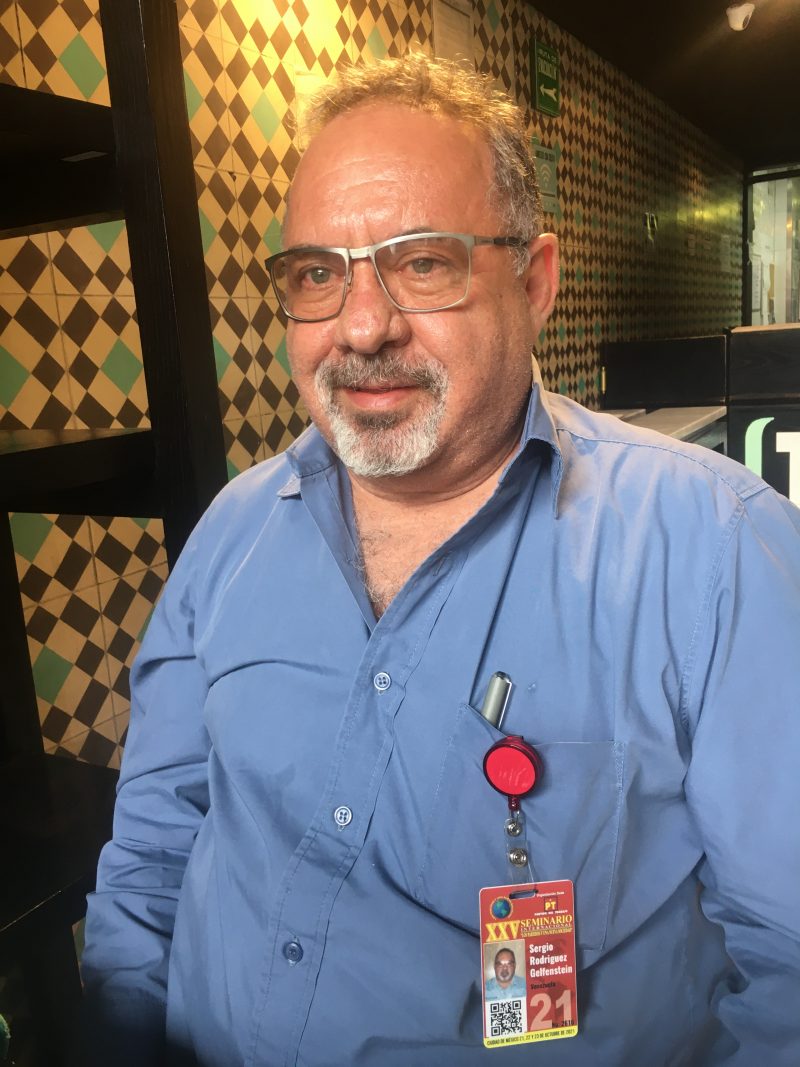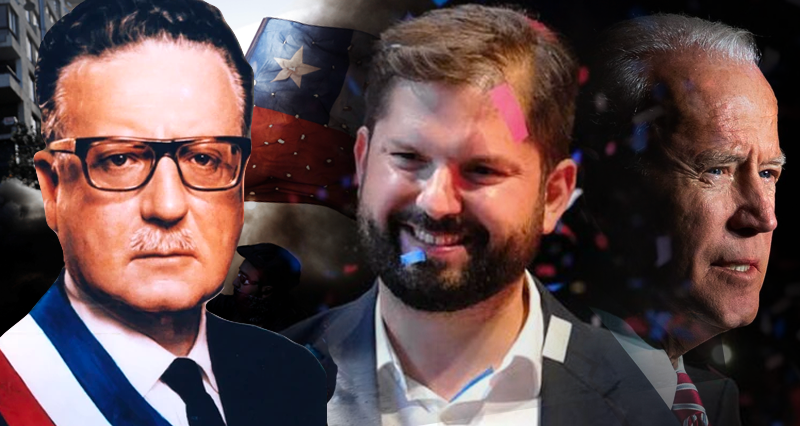A country’s revolutionary past looms over its contemporary days, when there is a change of government. Even more so, when the losing candidate affirms explicitly and positively the counterrevolutionary forces. And even more so, when the winner represents the Left. And if he is a young president of only 35 years with strong roots in the radical street protest movements, and his victory is embedded in a general trend towards the left in the continent, then the question becomes inevitable:
Is Gabriel Boric, who has won the presidential elections with 56% of the votes in December 19, Chile’s new Salvador Allende?
Symbols matter, explains Mexico’s leading leftist daily newspaper La Jornada’s columnist Pedro Miguel to United World International: “”Salvador Allende, Pablo Neruda, Victor Jara…These were symbols embraced by the whole continent. Chile in their times, in the times of the Unidad Popular, was a hope for the whole world. They have opened the door for a social transformation without using violence.”

“This symbolisms is still valid today”, adds Miguel says that the Latin American left considers Chile “as a lost brother”. An with Boric’s electoral victory, that “brother”, long time hijacked by the right and misused as a laboratory for neoliberalism, finally returns home, he concludes.
The Venezuelan Member of National Assembly for the United Socialist Party (PSUV), Jacobo Torres de León objects, saying to UWI “Boric does not fit into the shoes of Allende concerning the challenges he faces”.
“Chile’s Biden”
The Argentinian analyst Fernando Estreche expresses in our interview an even more radical opinion: “Boric is Chile’s Biden”.
Gabriel Boric’s electoral victory has caused a vivid debate throughout Latin America that focuses on his political program and Chile’s perspective in the continent. But arguments begin with his road to victory.
Boric entered the electoral race as a candidate of a broad coalition united under the label of “Approving Dignity”. He was elected to presidency in the second round of elections, after finishing the first round with 26% second behind the conservative candidate Jose Antonio Kast who achieved 28% of the votes.

“The second round of elections contained the possibility of fascisms return to power”, says Sergio Rodríguez Gelfenstein, Venezuelan international politics expert to UWI. “Hence the people reacted and voted for the lesser evil,” he adds.
To win the second round, Boric actively looked for the support of for instance Michelle Bachelet, former President for the Socialist Party and part of the historic “Concertacion”, a center-left-center-right coalition that governed Chile between 1990 and 2010. Boric on the contrary comes from the background of student and street protests, which attacked the named parties as part of the establishment.

Walter Sorrentino, National Vice-Chairman of the Communist Party of Brazil emphasizes speaking to UWI that Boric’s victory was “only possible by enlarging the support beyond the left”. But Sorrentino insists that Boric will establish a government “with the feet on the street”. The future of President seems to confirm that assessment with his first speech, where he stated that his government will “not work behind closed walls”.
Pedro Miguel agrees. Although the presidential position is very strong in Chile, the coalition of Boric will have to seek support in the Congress, he says. Here, Boric faces with “the right, the extreme right and the center three other coalitions besides of his own”, Miguel observes, expecting a “very complicated situation”.
Boric’s Government Plan
Relying on a broad and heterogeneous coalition and facing still strong adversaries may be the reasons why Boric has presented a pretty moderate Government Plan.

The text, whose introduction ends with the slogan “A new Chile to live better”, brings forward concepts like “feminism, just ecologic transition, decentralization and decent work”. “Sustainability”, “climate crisis” and “change with financial responsibility” are some keywords.
His immediate action proposals include a number of redistribution measures, such as a tax reform, pensions system reform, health system overhaul benefiting public health, cost-free urban transportation, elimination of students’ debt.
While “recuperation” from economic effects of the pandemic is giving priority, Boric proposes to create “feminine jobs”, strengthen workers’ organization and negotiation environment, raise the minimum wage and limit weekly working time to 40 hours.

The program presents also a strong emphasis on so-called gender politics, with legalizations and protection in the LGBT+Q field, liberal abortion politics and even “feminist diplomacy”.
“Follows Biden’s agenda” vs. “Biden was elected with progressive support”
These headlines lead Argentinian expert Fernando Esteche to qualify Boric as “a social democrat”. “The emphasis on LGBT, climate change, human rights is the international agenda of Joseph Biden. This is a nice but not progressive agenda, with which the social democracy works internationally”, says Esteche.
Esteche’s assessment seems to be confirmed with much talk in Latin America about a “Pink” Tide coming up with Boric’s victory. Some US authors even present the new Chilean President as an alternative to existing leftist government such as Venezuela, Cuba and Nicaragua.
But Pedro Miguel objects to qualifying Boric negatively due to his emphasizes. “He is not a ‘new leftist’. This is a false idea of leftism. The idea of a ‘New left’ is an illusion. Boric simply recovers old and traditional left values. Caring for the environment, women’s liberation or, generally speaking, policies of liberty were always leftist,” he says. And adds: “Biden was also elected thanks to the support of progressives.”
Walter Sorrentino from Brazil supports the notion, saying “the insistence on a sustainable and ecologically responsible development is correct and very important for socialists”.
Main challenge: neoliberalism
During his campaign and after his victory, Boric was cited frequently in the press with his claim that Chile would “become the graveyard of neoliberalism”.
Following Pinochet’s putsch in 1973, the country indeed had become the laboratory of neoliberal policies on the continent and even world wide, with deregulation, commercialization, privatizations, capitalization of pensions, limiting the state’s role in economy, and amplified free trade arrangements.
But the past decade saw protests erupting more and more against the consequences of these policies, receiving climax in 2019, when the then-President Pinera was almost toppled by protesters in heavy clashes.
“Neoliberalism in Chile is so strong and so embedded that, to abandon it, not a presidential period but the time of a whole generation will be necessary”, says Torres de León . But will Boric even try to?
Walter Sorrentino is optimistic. Highlighting also the strong role of the Communist Party in Boric’s government, he says the Chilean President “heads towards deep reforms and a strong struggle against financial neoliberalism. He has proposed a national consensus to serve the country’s development, and places the state at the center of economy as main actor. The creation of a state-owned Bank for Development, which shall provide credits to small and medium size enterprises is a very important step on the road.”
“Allende has expropriated copper mines, that’s not possible anymore”
Mexican journalist Pedro Miguel chooses a careful tone: “Back then, Allende has expropriated the copper mines. This is today not possible anymore, because the nation-state has lost its power against private companies to a large degree. There is a common sense today that the market cannot be abolished and the means of the production cannot all be expropriated. Besides, anti-neoliberalism is not anti-capitalism.”
“The task is to reform without provoking a catastrophe”, adds Miguel and says there are ways of compromise: “Not nationalization but reindustrialization. Take our example here in Mexico. We have prohibited the export of certain resources, such as oil, and we have not given any new concessions for mineral extraction. This is the way Chile may follow. They may seek a model where the state concentrates on satisfying the needs of the population instead of those of companies.”
Venezuelan analyst Gelfenstein is more skeptical. Pointing out that results of economic growth have not been distributed evenly among the population, with a few owning ever more of the country’s riches, Gelfenstein observes in Boric “the continuation of Bachelet’s and the Concertacion’s policies. His expects that the people will continue expressing demands especially concerning social improvements, which Boric “will not be able to respond to positively. I would very much like to be wrong, but I have serious doubts about his government.”
Foreign policy: change or continuation?
A continent-wide much debated issue is what to expect from Boric’s foreign policy.
The new President, who will take over the power in March 2022 after a period of transition, promises in his program “strengthening bilateral, regional and global relations”, with a diplomacy of entrepreneurship” led under the perspective of “feminist foreign policy”.
Topics that Boric wants to concentrate on are – again – sustainability, human rights, migration, but also trade policy, where he proposes the “actualization or modernization of existing trade agreements to achieve better instruments to respond to global challenges”.
The most optimistic expectation again comes from Mexico. Pedro Miguel says that with Boric’s election, “ a progressive block has been almost completed, with Mexico, Peru, Chile, Argentina and Bolivia taking part. Only missing are Colombia and Brazil that both face elections in 2022.” For Miguel, the common denominator of this bloc is emphasis on sovereignty, social development and an impulse for regional integration, specifically within the CELAC”.
Boric responds to greetings from France, Bolivia, US, European Union and Canada
The social media account of Boric seems to indicate otherwise till now. Following his electoral victory, Boric received congratulations from all over the world. But he was quite selective in mentioning these, for instance over his social media account.
Boric responded publicly to the congratulations from the President of France, Prime Minister of Canada, the European Union’s High Representative for Foreign Affairs, the US President and the President of Bolivia.
Walter Sorrentino emphasizes that Boric’s foreign policy is determined by “a coalition and not rupture. But still, the new President places the state and the national sovereignty at the center of his policy.”
“The Cartel of Lima, established by the US to pressure countries such as Venezuela and Bolivia is now effectively dead, with only Brazil and Paraguay remaining on the right”, says Venezuelan Member of Parliament Torres de León . He says that as long as the new president respects Venezuela’s right to self-determination and collaborates in policies of regional integration, such as CELAC, MERCOSUR and UNASUR, relations between the countries will develop positively.
“But”, adds Torres de León , “Chile’s right wing parties will exercise pressure on Boric for a hardline against Venezuela”.
Polemics with Allende’s grandson
Fernando Esteche from Argentina is much more critical of Boric concerning foreign policy and regional integration. Esteche reminds that Boric had applauded US-supported protest actions in Venezuela and Cuba.
Truly, then Member of Parliament in Chile, Boric has accused Venezuela’s President Maduro of committing “violations of human rights which needed to be condemned categorically”.
The grandson of Salvador Allende, Pablo Sepúlveda Allende responded in an open letter to Boric, blaming him for “simplistic, absurd and misinformed comparisons”.
Miguel responds that Boric made these statements when he “not even was dreaming of becoming Chile’s president” and explaining them with the bilateral relations between Chile and Venezuela and Cuba respectively.
Still noteworthy that reporting about his phone call with US President Biden, the president-elect of Chile mentions “strengthening democracy as a joint challenge”.
Hence, Esteche rejects the idea that Boric represents a geopolitical turn. For the Argentinian analyst, the future President of Chile represents “full continuity in foreign policy. Argentina and Chile probably will deepen foreign policy coordination along the lines provided by the US”, he says.
And how long will Boric govern at all?
And in parallel to the presidential elections and change, there is the process of writing a new constitution for the country going on. The Constitutional Convention, elected by the population and dominated strongly by forces on the farther left, is expected to deliver a draft in the coming year.
This draft will be presented to a referendum, and if approved, it may even lead to new elections, as it would provide a new bases for the political system.
Boric already has expressed strong support for the constitutional process, which he called “Chile’s source of pride worldwide”.
Venezuelan analyst Gelfestein says the Constitutional Assembly will provide “the institutional democratization of Chile with establishing a nee social pact”. He expects Boric to play a constructive role in that process.
“Latent threat to Boric”: Chile’s armed forces
Pedro Miguel agrees and says “the new constitution will substitute the one inherited from Pinochet and diminish the weight of neoliberal forces. It will also address the problems of indigenous people and human rights”.
But the Mexican journalist has a warning too: “Chile has an armed forces of very Prussian, bourgeois, elitist character. Their record concerning subordination to civilian authority is horrible. Additionally, they are very involved in the economic sphere, where Boric will also have to lay hands on. Therefore, this very oligarchic military represents a latent threat for the President-elect of Chile.”
One thing is for sure in the South American country: The election of Gabriel Boric Font to the presidency has accelerated the motion of things even more. The continent is heading towards the left. Whether a so-called Californian-Left or a revolutionary one, that still is up to debate and conflict.
The interviews in this article were conducted via phone and email.

















Leave a Reply